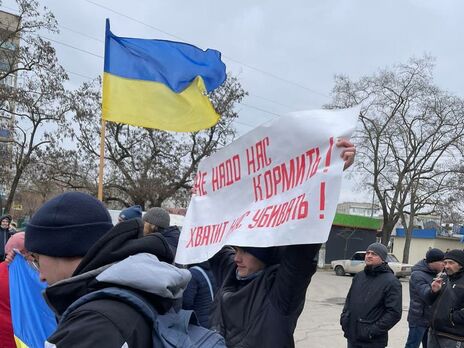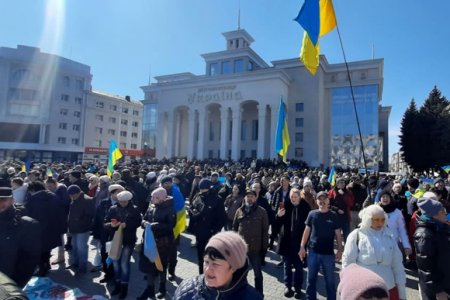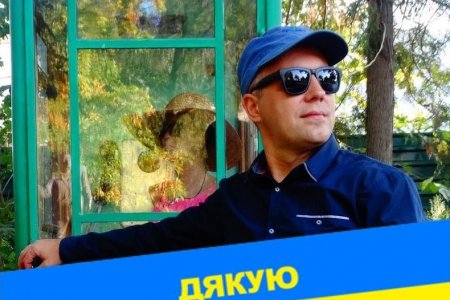
Among Russian leader Vladimir Putin’s many lies about his war against Ukraine was the claim on 24 February that Russia was not seeking to occupy Ukrainian territory. Not only are the Russian invaders continuing to occupy parts of the Zaporizhzhia and Kherson oblasts, often raising the Russian flag, but they have already staged one fake vote on occupied territory and, according to Ukraine’s Military Intelligence, are planning to put on a number of other pseudo referendums to try to ‘legalize’ occupation administrations. As with the Russian offensive against Mariupol and other cities in Donbas, the plan appears to involve hiding behind Russia’s proxy ‘Donetsk people’s republic’.
Occupied Rozivka Territorial Hromada (Zaporizhzhia oblast)
The Zaporizhzhia Regional Administration reported on 19 April that the Russian invaders, who have occupied this territorial community (including the town of Rozivka) since 2 March used deception to fake a ‘referendum’. The Russians initially carried out a so-called ‘census’ and also raised the ‘flags’ of the Russian proxy ‘Luhansk and Donetsk people’s republics’ [‘L-DPR’], with a ‘DPR leader’ sent to the Hromada.
According to Artur Krupsky, Head of the Polohy raion (which includes the Rozivka Hromada), they have information that the population of the Hromada, who are mainly elderly, or people who fled Mariupol, were tricked into gathering at the local house of culture. The residents were told that the meeting would be discussing payment of pensions and identifying their social and everyday needs. Instead, they were read out a so-called ‘memorandum’ on holding ‘elections for a new mayor’ and also appealing to ‘DPR’ to join them while Zaporizhzhia remains under Ukrainian control. The ‘meeting’ where residents supposed “voted to join the Donetsk people’s republic’ was then widely posted on social media and on Russian television. Krupsky is adamant that terrified residents were forced ‘to vote’ for things they did not understand and that had no legality. He stresses that they are aware of the collaborators who took part in this deception, and calls on members of the Hromada to avoid taking part in any further stunts.
There are no grounds for doubting that all such plans originate in Moscow, and it was, of course, Russian state media that effectively confirmed the stunt, citing the Russian-appointed ‘DPR head’ Denis Pushilin. Izvestia, for example, had as its headline: “DPR will consider the request of residents of the Rozivka district to join the republic” Pushilin is later quoted saying that the supposed “wish of residents of the Rozivka district of the Zaporizhzhia oblast to become a part of DPR will not be ignored”. He claimed, on Russian TV, that this was not the first “appeal”, and went on to please his Kremlin paymasters by asserting that the population had “suffered for the last eight years and were tired of the Nazi regime”, etc., etc.
On 27 March, the same newspaper quoted the so-called ‘LPR leader’ Leonid Pasechnik as speaking of plans to hold a ‘referendum’ on joining Russia. Aleksandr Borodai, one of the Russians responsible for the supposedly ‘Ukrainian separatist’ DPR and now a Russian State Duma deputy from Putin’s ruling ‘United Russia’ party is quoted as suggesting that a similar scenario would be likely for ‘DPR’.
All of this is a remake of the pseudo ‘referendums’ that Russia used to try to legalize first its annexation of Crimea, and then the creation of the proxy Russian ‘republics’ in Donbas.
Neither western countries, nor their media, were ever firm enough in exposing the lies around Crimea and this supposed ‘referendum’. The repeat performance in Donbas two months later did at least elicit a fairly firm response from the West and Russia steered clear of ‘recognizing’ the results it had orchestrated. While it is hard to imagine that any western country would accept fake ‘referendums’ now, there may well continue to be pressure on Ukraine to reach territorial ‘compromises’ in exchange for ‘peace’. The latter would be temporary and the fact that Russia is already occupying parts of Ukraine outside Donbas, tried to seize Kyiv and is still trying to take Kharkiv means that any such deal would lead to further Russian ‘Lebensraum’ demands.
There has, in fact, been talk since Russia’s 2022 invasion began that Russia would try to establish so-called ‘Kherson’ and, perhaps, Zaporizhzhia ‘people’s republics’. Any such attempts, especially in the Kherson oblast, have run into unequivocal opposition from the local authorities and look absurd in the face of ongoing protests against Russian occupation. Unlike attempts to muster pro-Russian demonstrations, the demonstrations affirming that Kherson is Ukraine and will remain so attract crowds, despite the danger people are in from the Russian occupiers,
The plans have not, it would seem, been abandoned. On 19 April, Ukraine’s Military Intelligence reported that ‘voting forms’, brochures; posters and booklets are being produced in the Kherson oblast for holding a pseudo referendum on the creation of a fake ‘Kherson people’s republic and recognition of the occupation regime. Local residents are convinced that there will not be any real voting, and that passport details, obtained in order to receive ‘humanitarian aid’ will be used to fake votes.
The report also mentions a fake referendum on ‘electing’ a so-called mayor and on administrative unification with occupied Crimea which is believed to be planned in Snihurivka, Mykolaiv oblast. This stunt is, apparently being organized by the pro-Russian head of the local council Tetiana Mezina and the former head Oleksandr Larchenko.
All of the above makes it critically clear why western countries need to be doing more to help Ukraine defend itself now.



